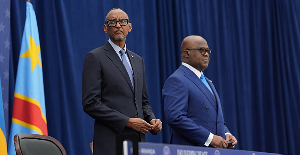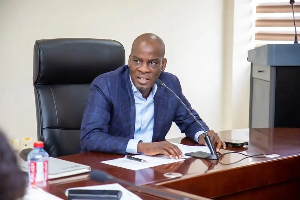Dr Delanyo Davlo, a retired Director of Health Systems and Services at the World Health Organisation (WHO) Africa Regional Office, on Tuesday called for innovation and focus on “problem solving” approaches by researchers, to address the country’s burning health problems.
He said although all types of important researches were being carried out, majority of the strategies were dependent on “opportunistic” external grants whose focus were not always on national health priorities.
Dr Davlo who made the call in an address at the opening of a three-day National Health Research Dissemination Symposium (NHRDS) in Accra, stressed on the importance of quality research and data in informing policy decisions and providing sustainable solutions to Africa’s key health challenges.
He however said his role on research in Regional Office led to the realization that only three per cent of research originating from the Africa region was led by local researchers.
While the significant resources from Global Health Initiatives such as the Global Fund, Global Alliance for Vaccines and Immunisations (GAVI), and the President’s Emergency Plan For AIDS Relief (PEPFAR), had helped to achieve major morbidity and mortality reductions for key diseases.
“We have not seen major development of truly sustainable and responsive systems working on important local health priorities such as Non-Communicable Diseases (NCDs),” he said.
He said Africa was faced with a “triple disease burden” with NCDs, communicable, reproductive and maternal health burdens at unacceptable high levels, and that the extraordinary rising urbanisation rates was a wake-up call for the spread of service which, had remained embedded in a rural health paradigm.
Dr Dovlo called for strategies to make research the driver of innovation and progress towards attaining the Sustainable Development Goals (SDGs) and Universal Health Coverage (UHC).
He recommended the development of a firm strategy for financing research, which must include the mobilisation of domestic funds to improve the total health expenditure.
He also encouraged the widen of resource allocation often skewed by earmarked and unsustainable foreign aid, while prioritising the implementation of research and ensuring innovative outcomes that responded to “our different context”.
He also called for the development of an overreaching research strategy to guide the generation of priorities; making research skills capacity available to all health professionals and institutions at all levels, to ensure a core problem solving capacity for UHC.
The annual symposium was being co-hosted by the United States Agency for International Development (USAID) and the Evaluate Project in collaboration with the Research, Statistics and Information Management Directorate (RSIMD) of the Ministry of Health and the Health Research and Development Division (RDD) of the Ghana Health Service (GHS).
The symposium is on the theme: “Speeding up Progress towards achieving Sustainable Development Goal 3 through Research Innovation and Partnerships”.
Dr Anthony Nsiah-Asare, the Director-General of the Ghana Health Service said the symposium provided the opportunity to select research scientists to share their works which had policy, programme and practice implications for accelerating progress towards the attainment of the SDGs.
He said it also focused on supporting UHC, improving maternal and newborn health and reducing premature mortality from NCDs.
Dr Nsiah-Asare applauded the efforts of the county’s three major research institutions in Navrongo, Kintampo and Dodowa for their involvements in achieving major health outcomes, but admitted that there was the need to do more by changing from how things had been done in the past.
Mr Lawrence Odartey Lawson, the Deputy Director at the Ministry of Health, said the outcome of the meeting, as well as other research findings, would be fed into policy decisions to help strengthen and bridge the existing gaps in Ghana’s health system.
Dr Abraham Hodgson, the Director, Research and Development Division, GHS, explained that there would be both oral and poster presentation, panel discussions and speeches, as well as plenary sessions where representatives of the breakout sessions would report back on key issues raised during the sessions for further discussions.
General News of Thursday, 13 June 2019
Source: ghananewsagency.org
Researchers urged to be innovative
Entertainment












